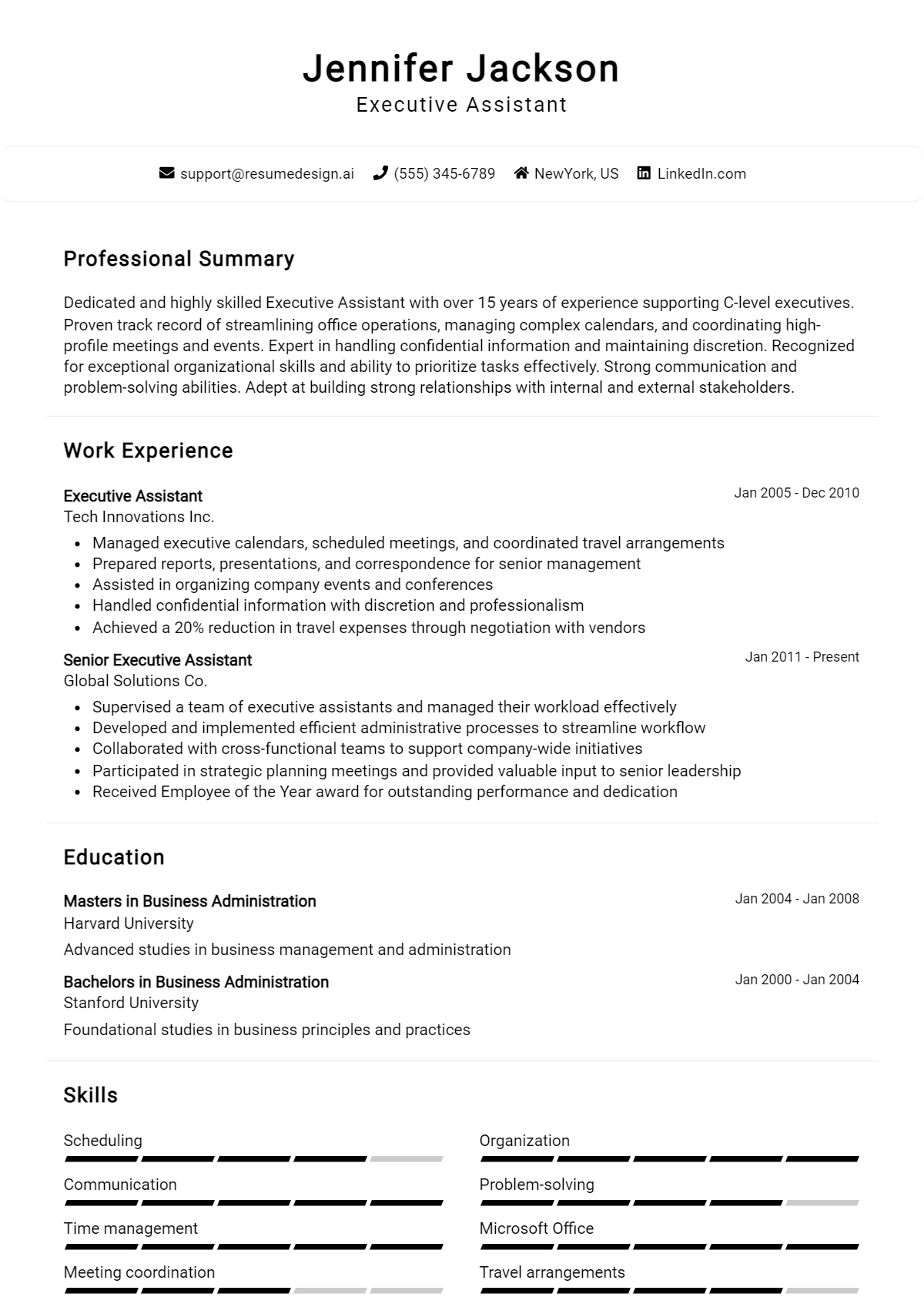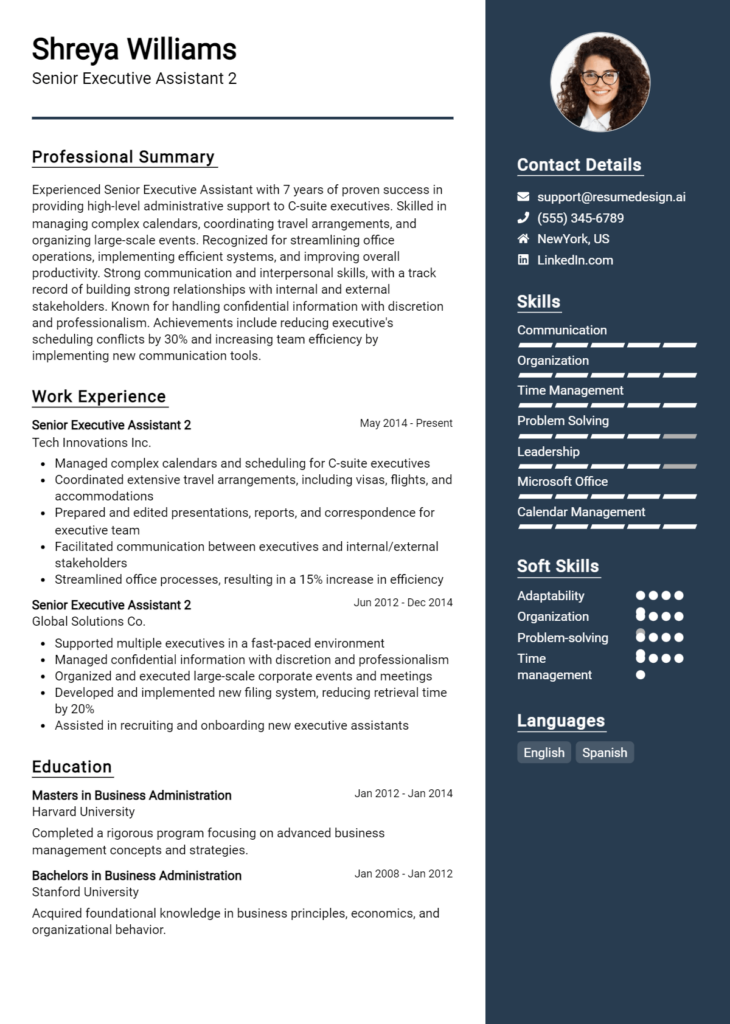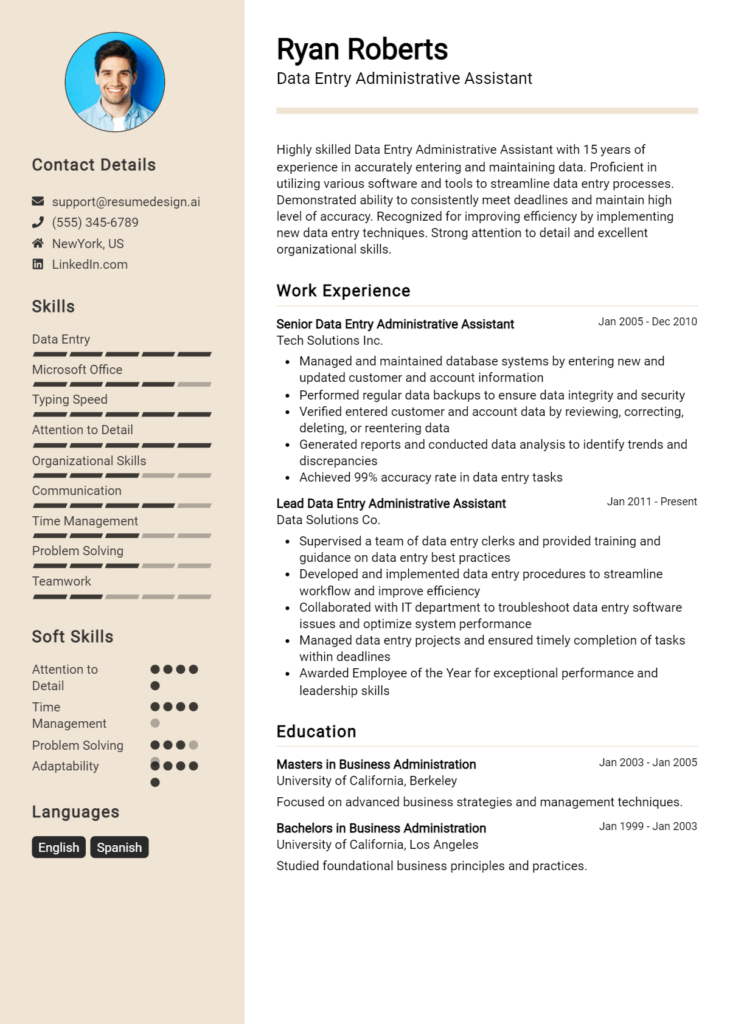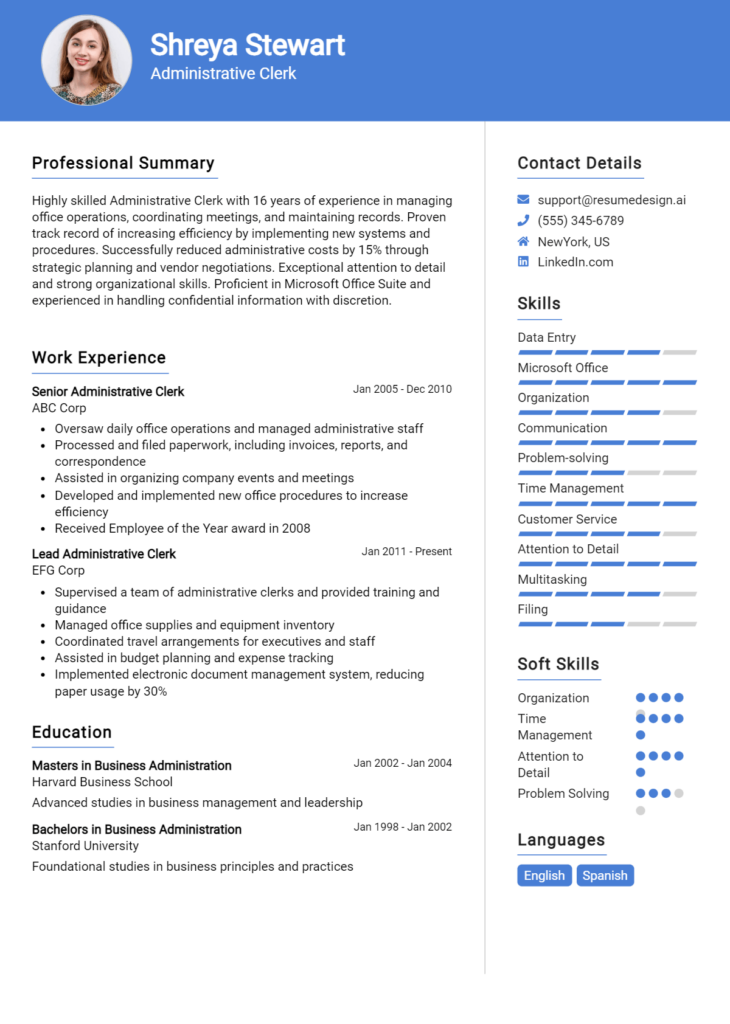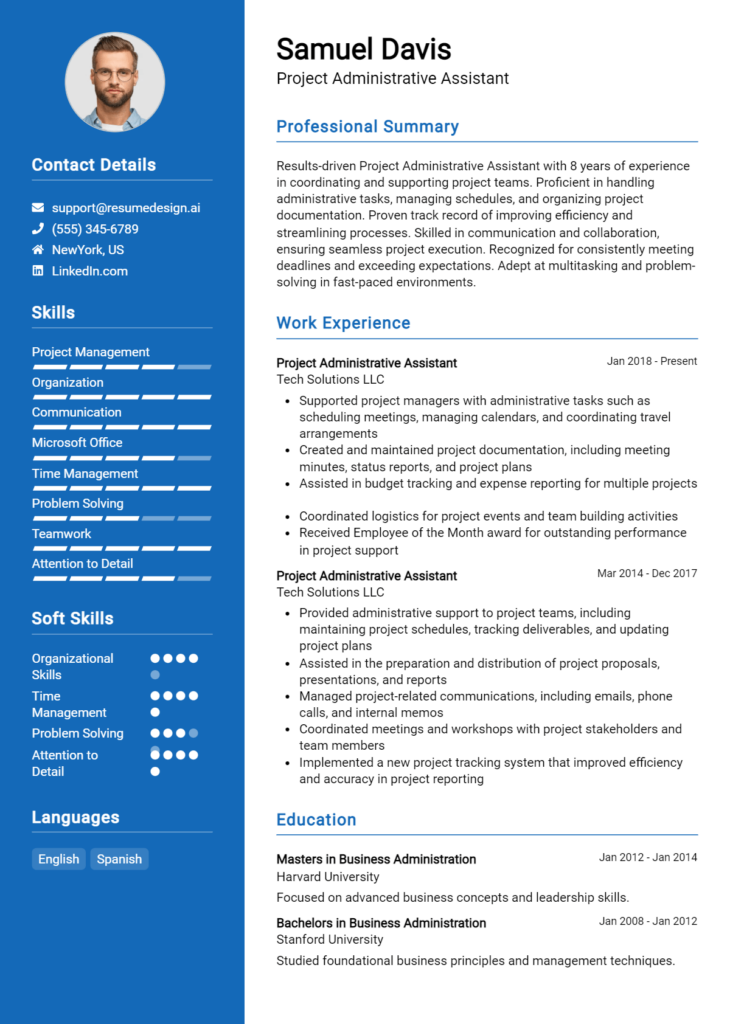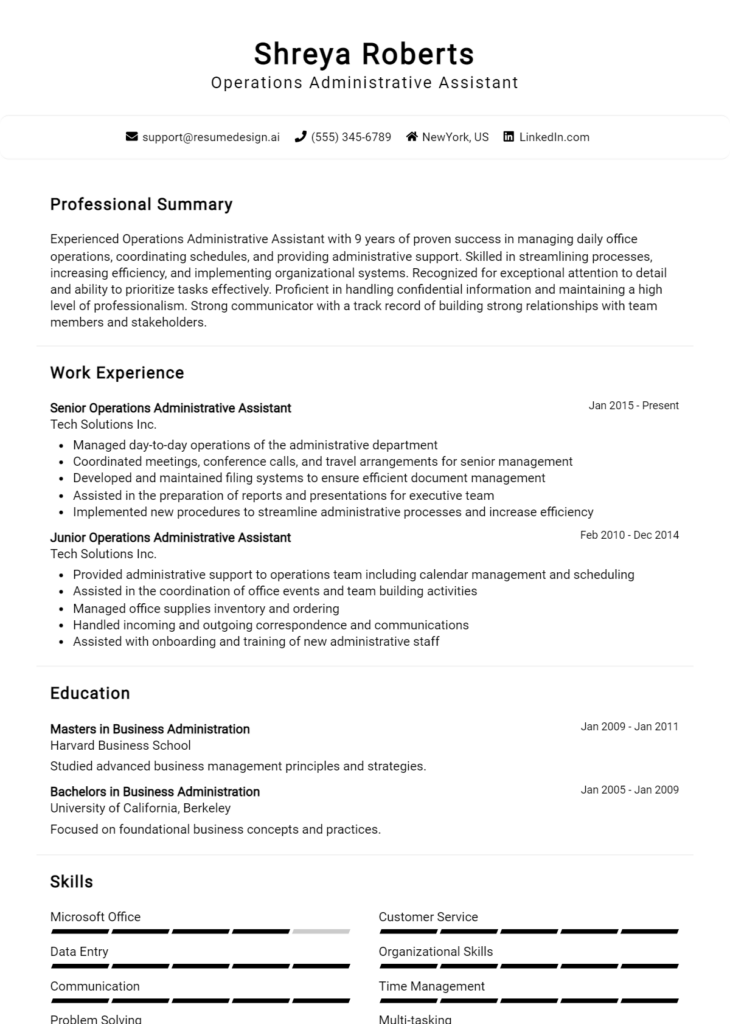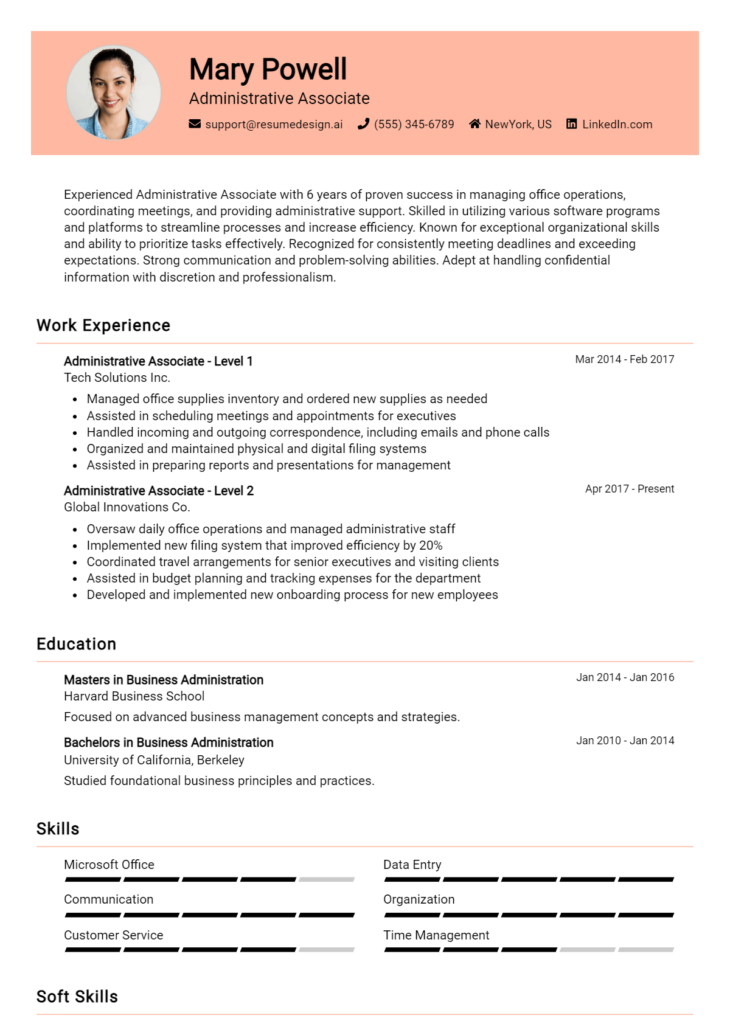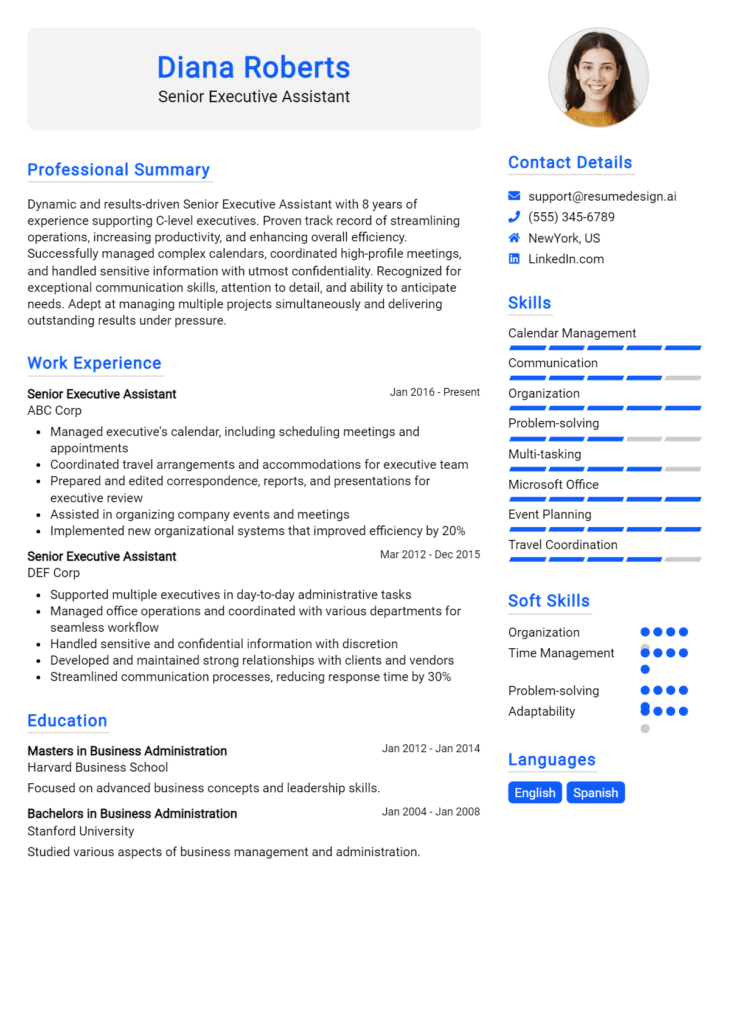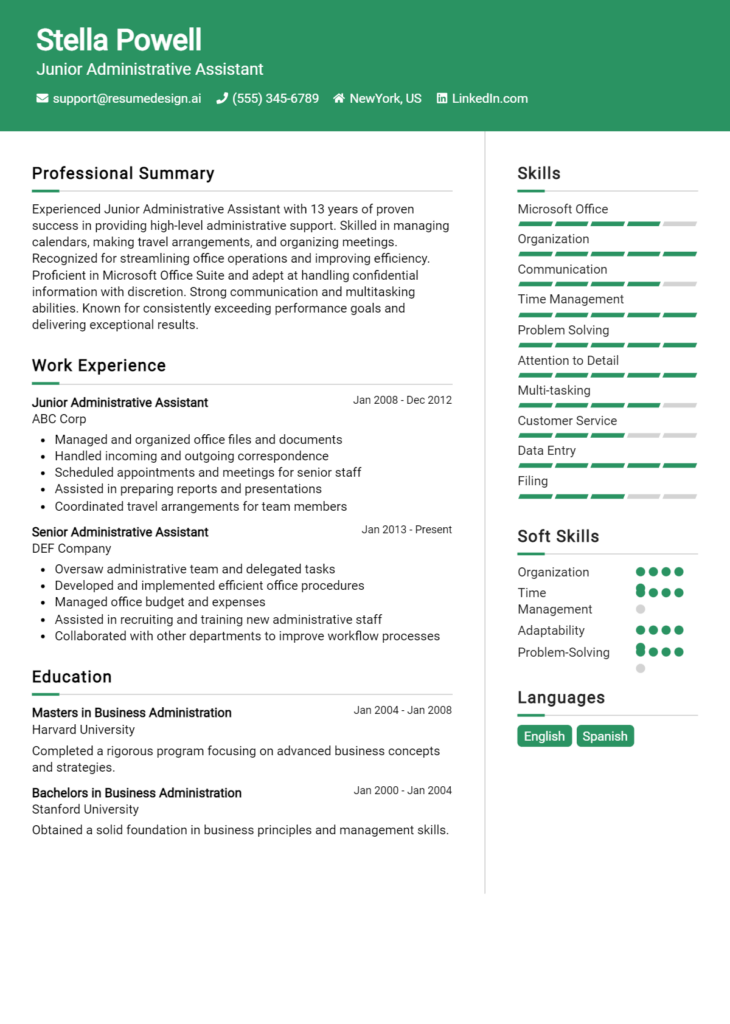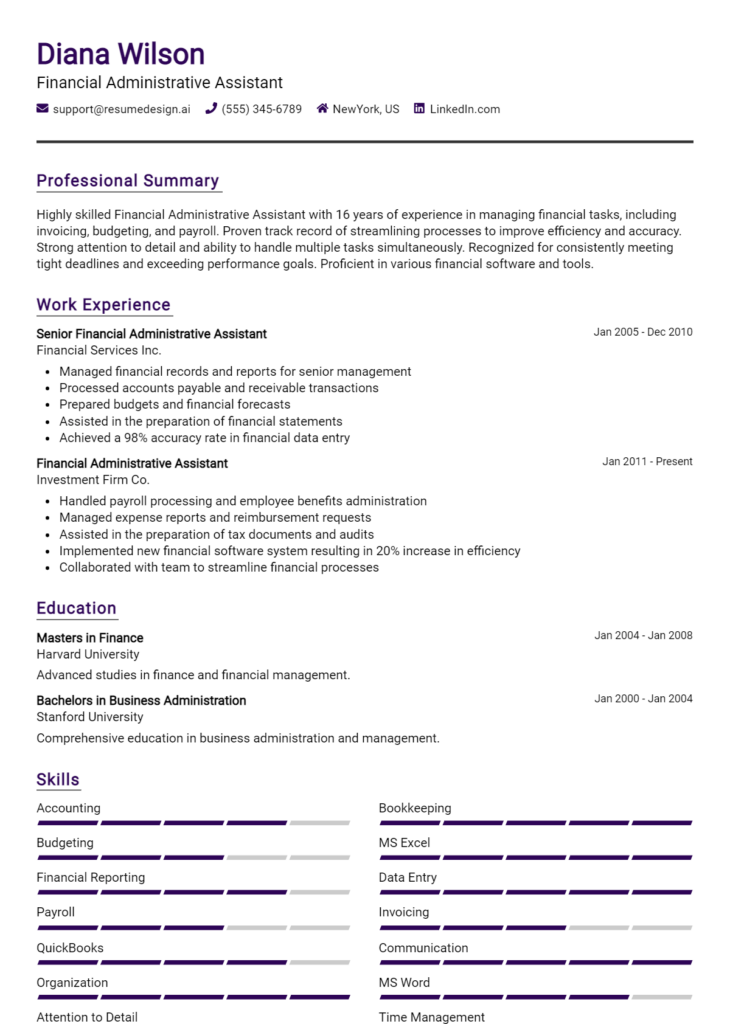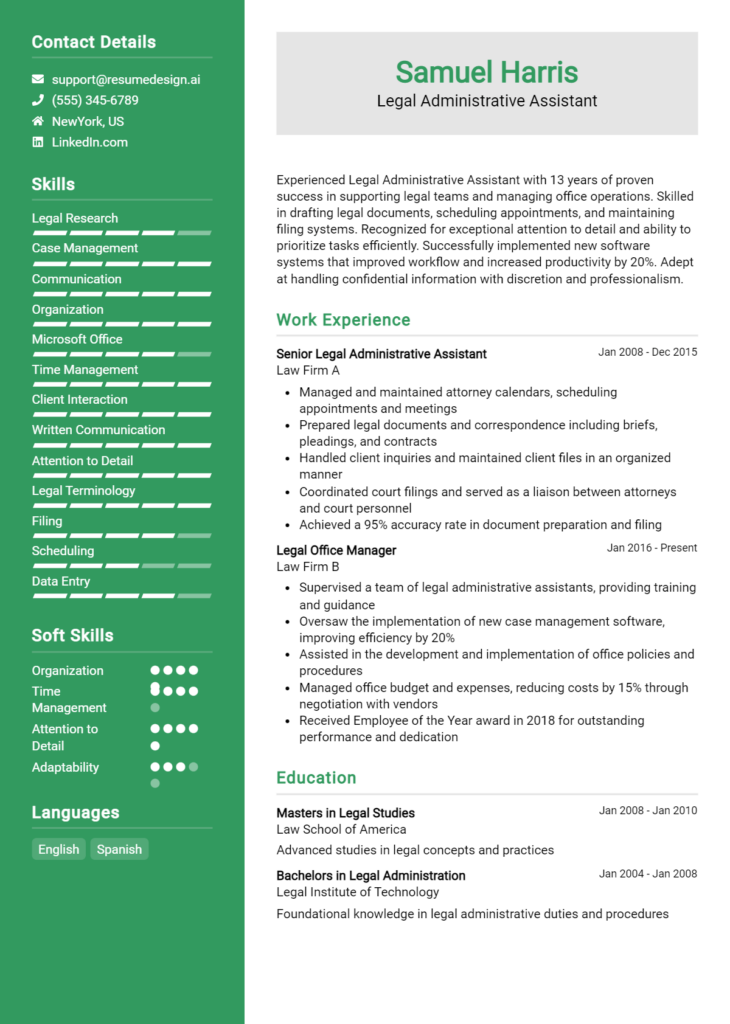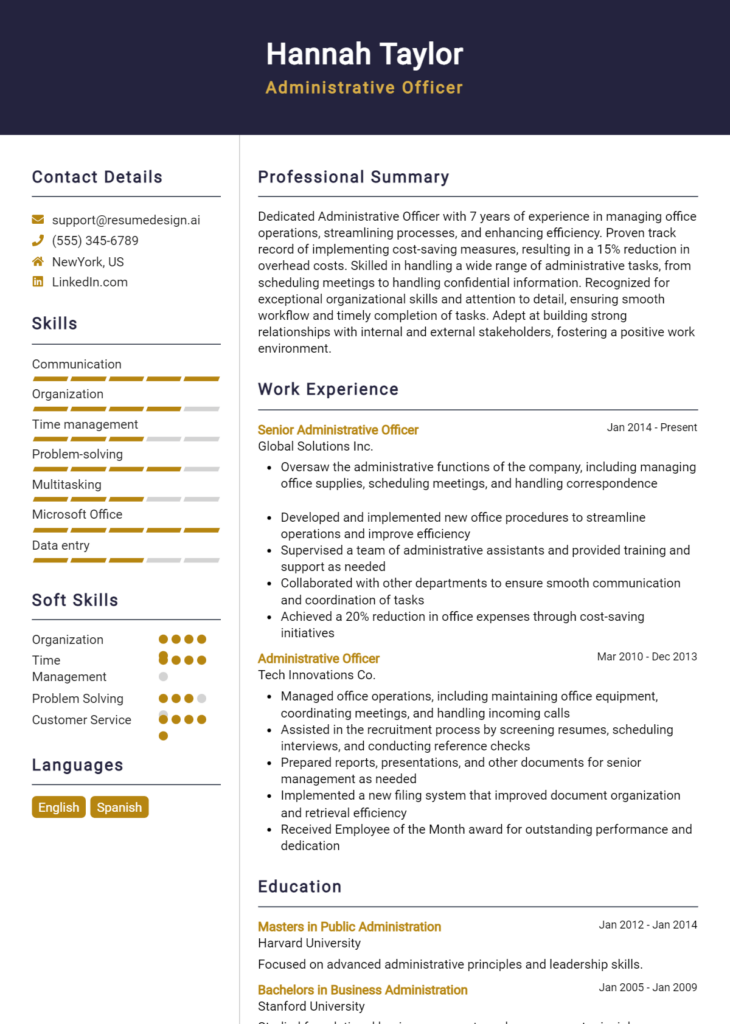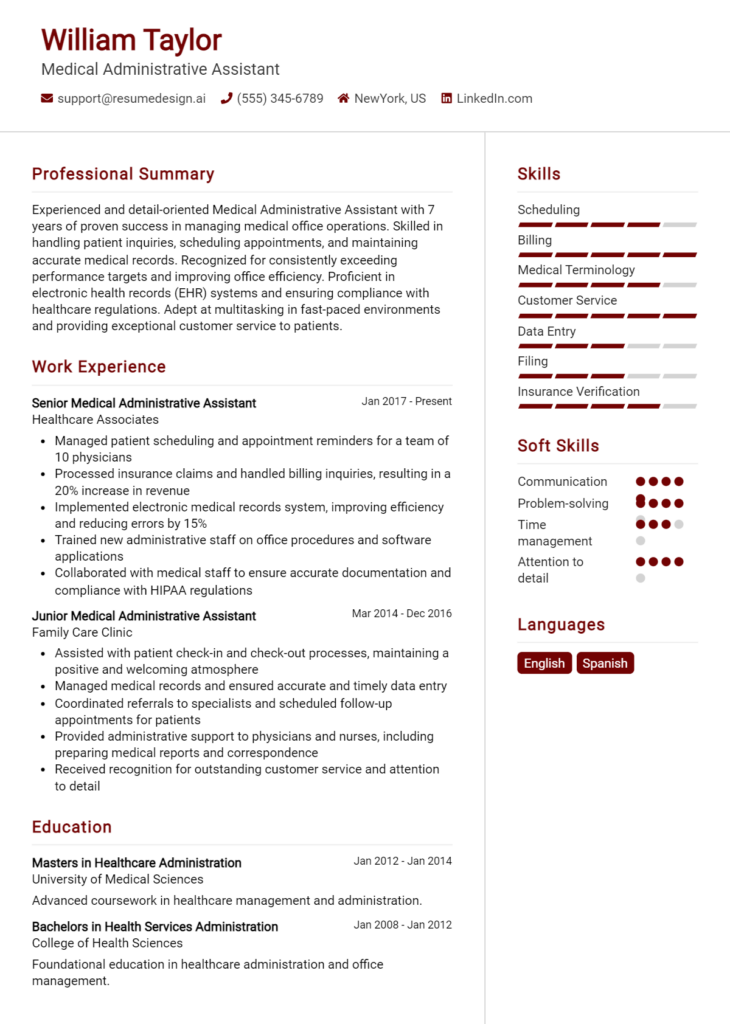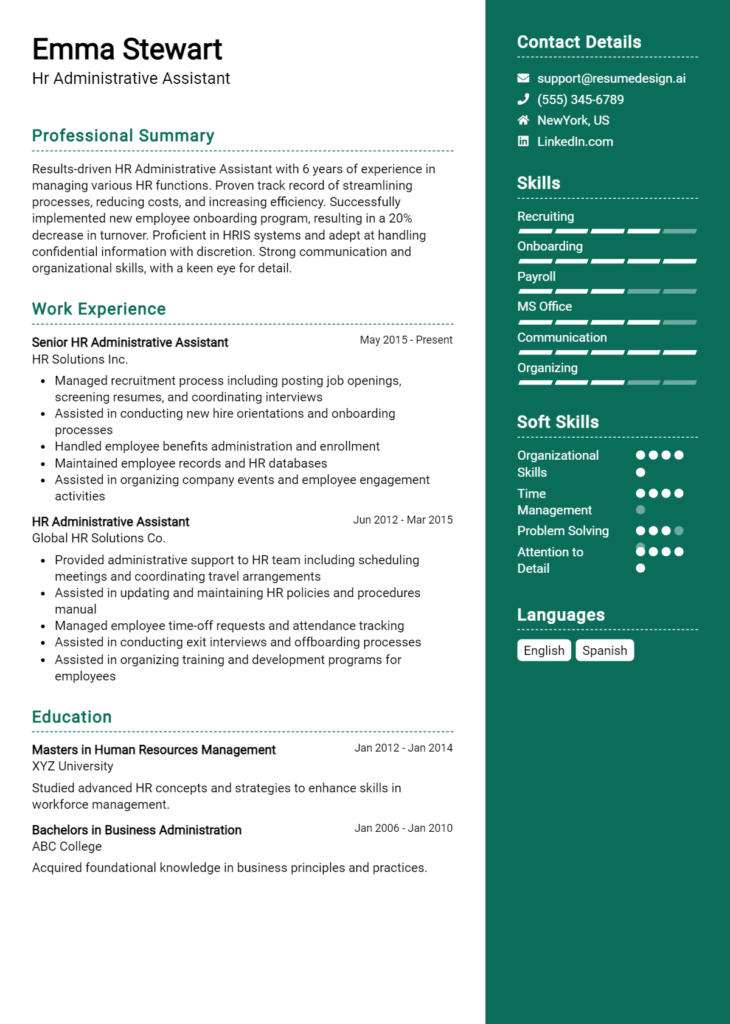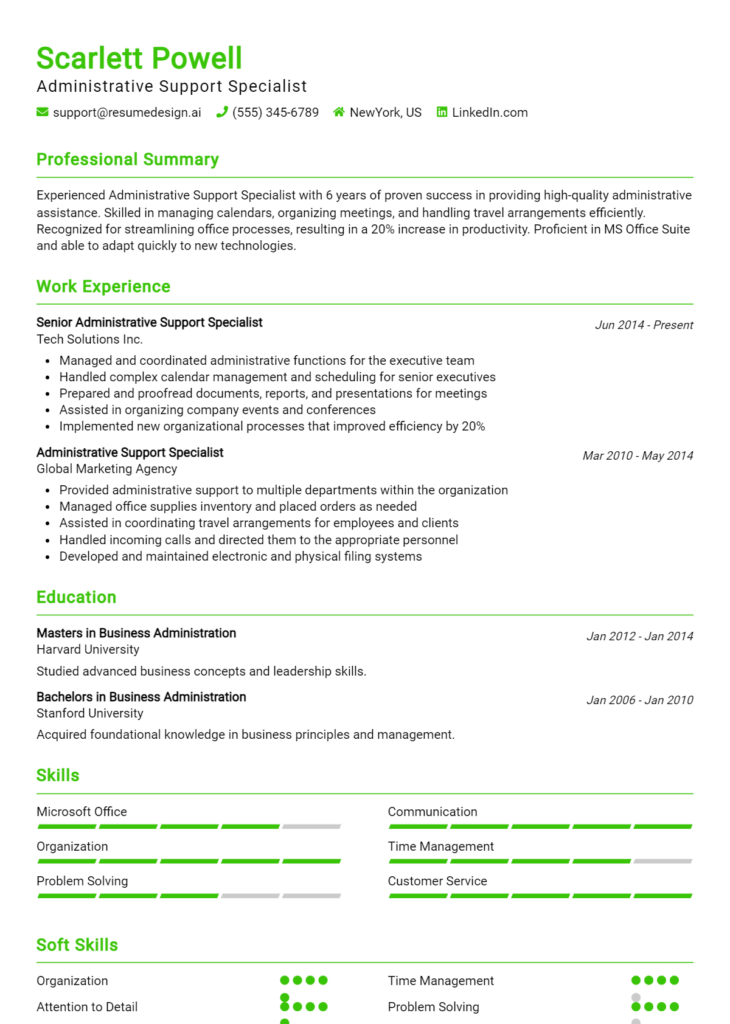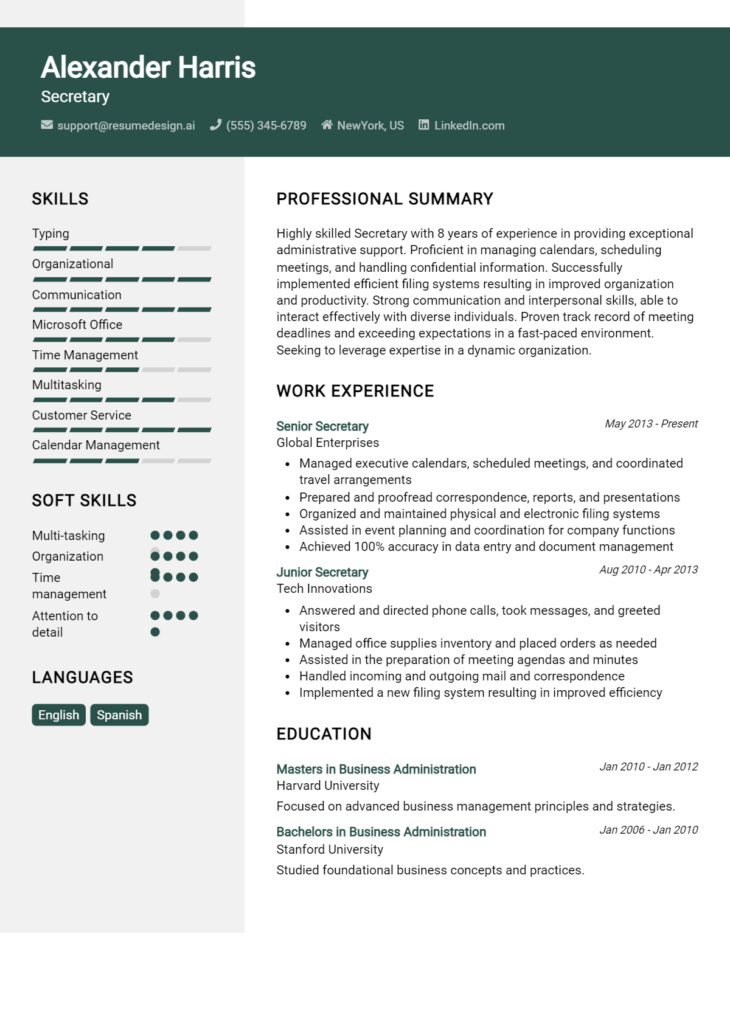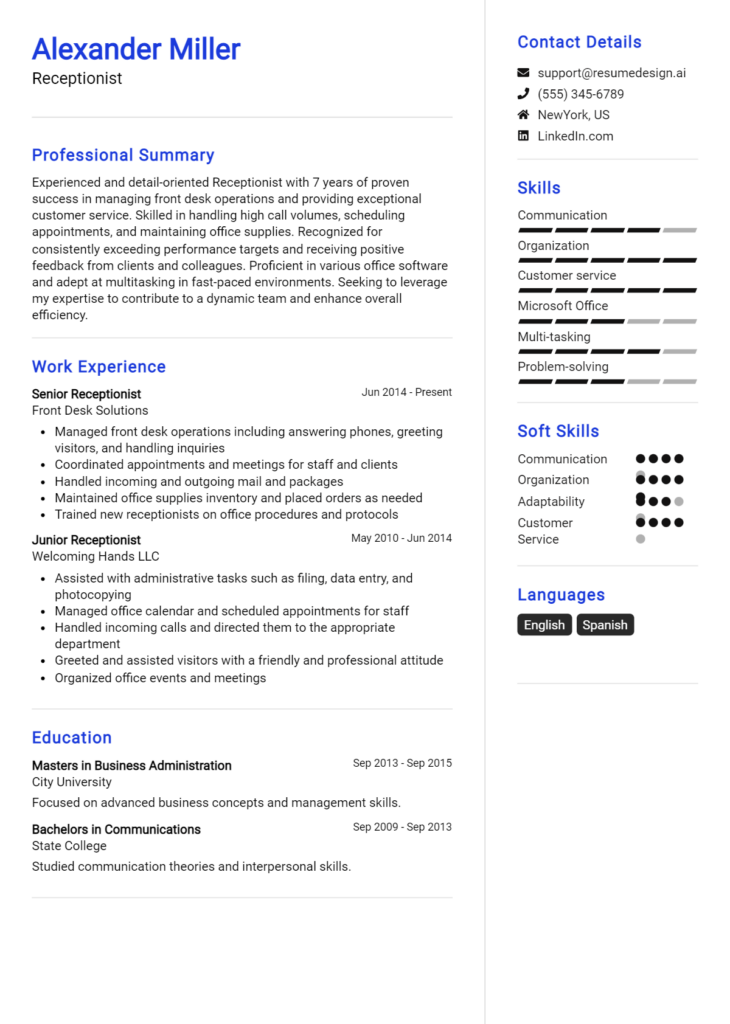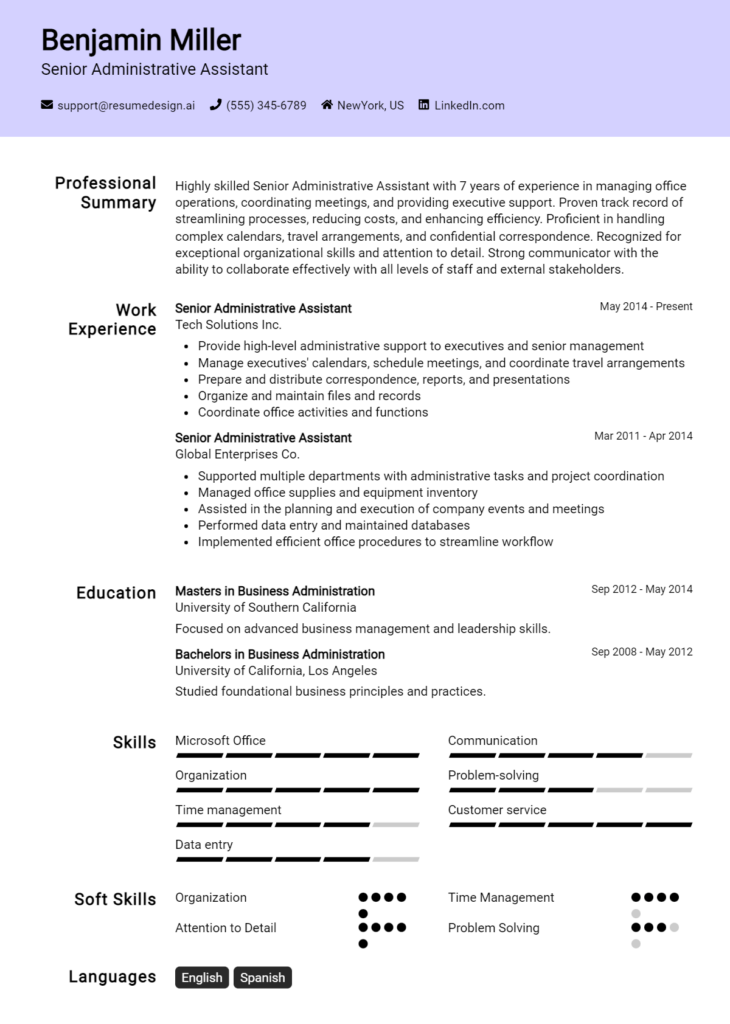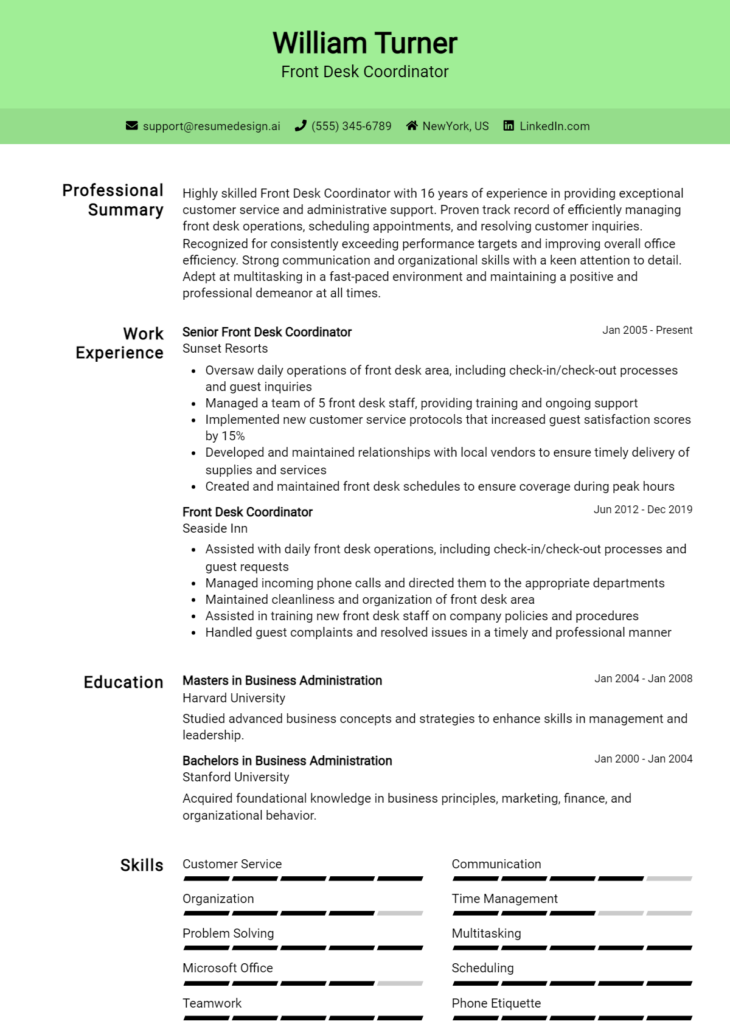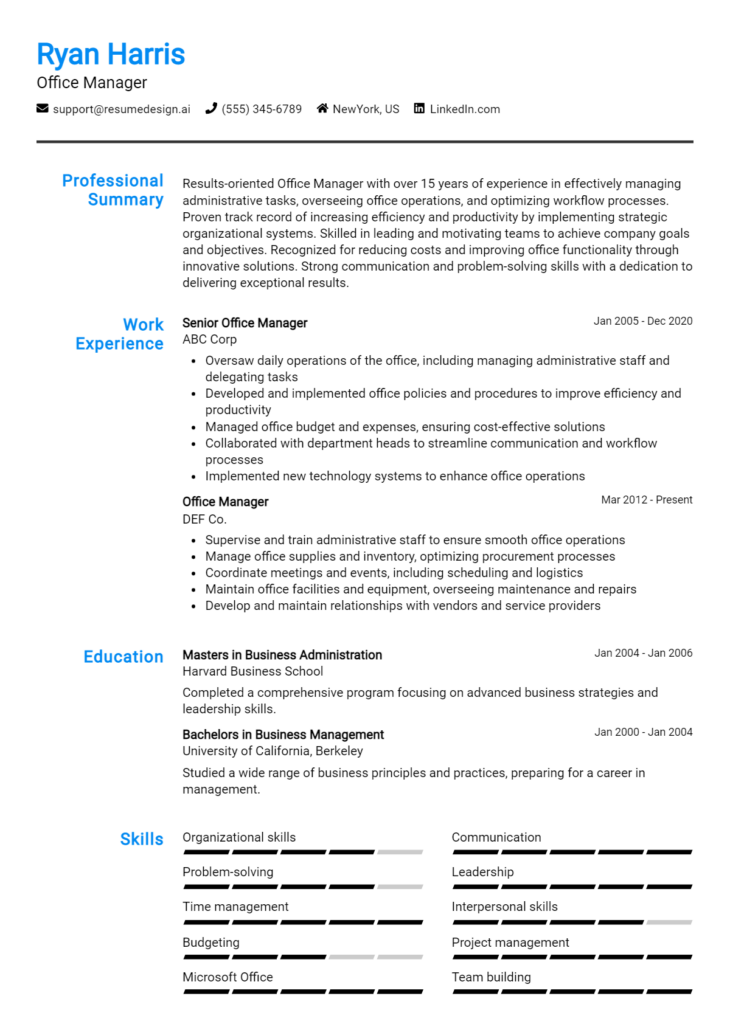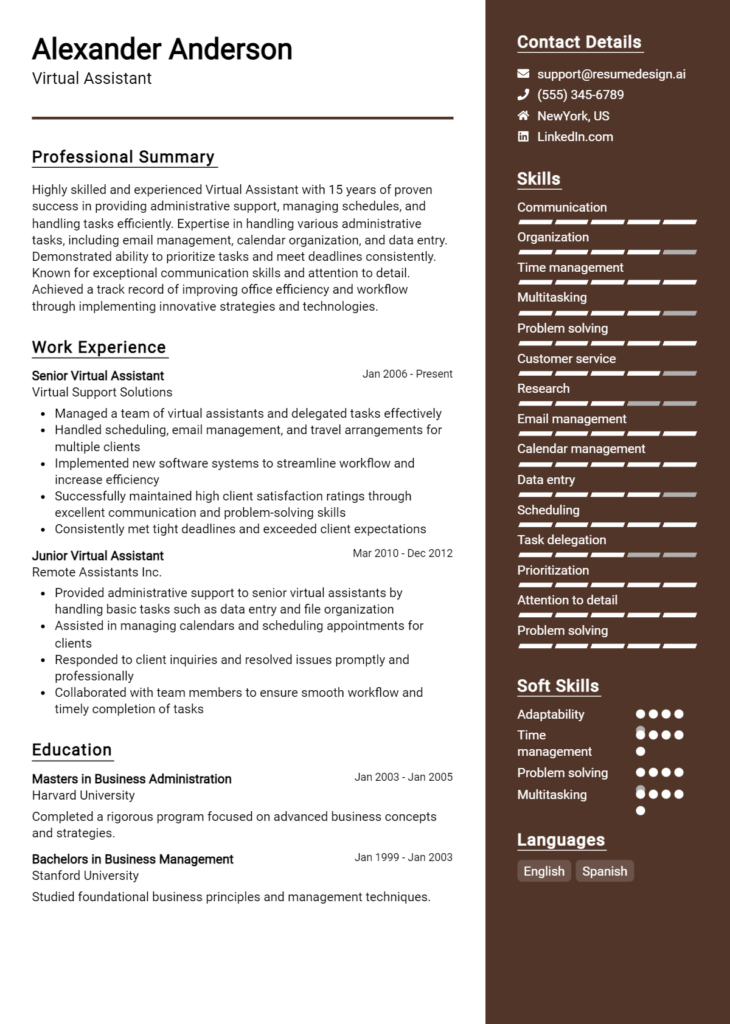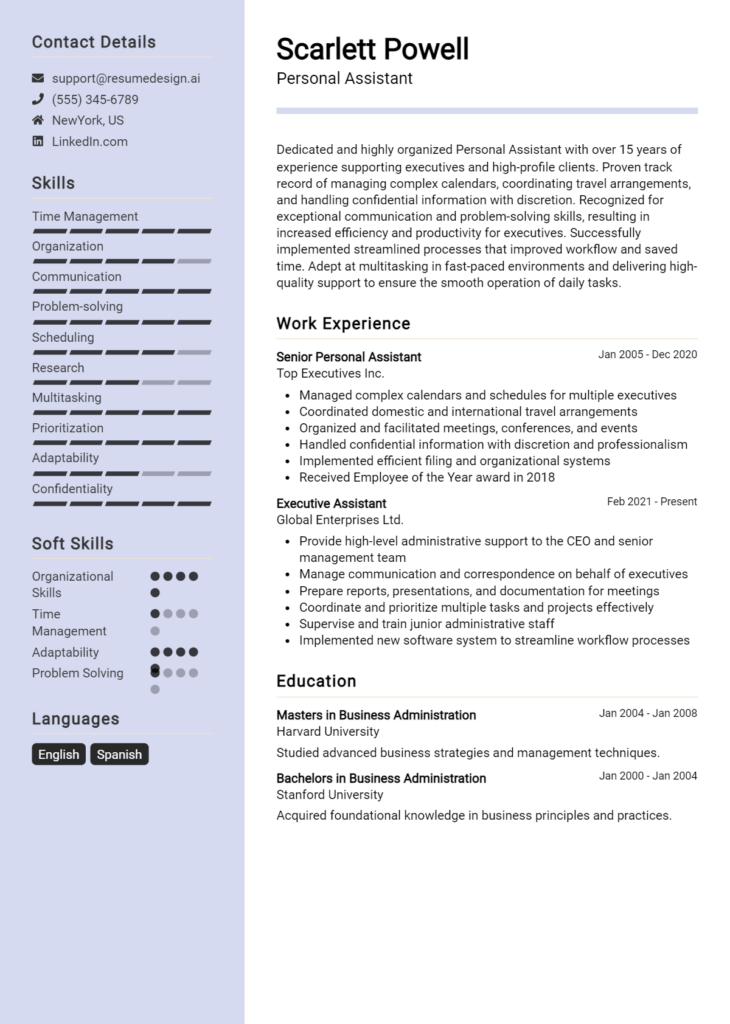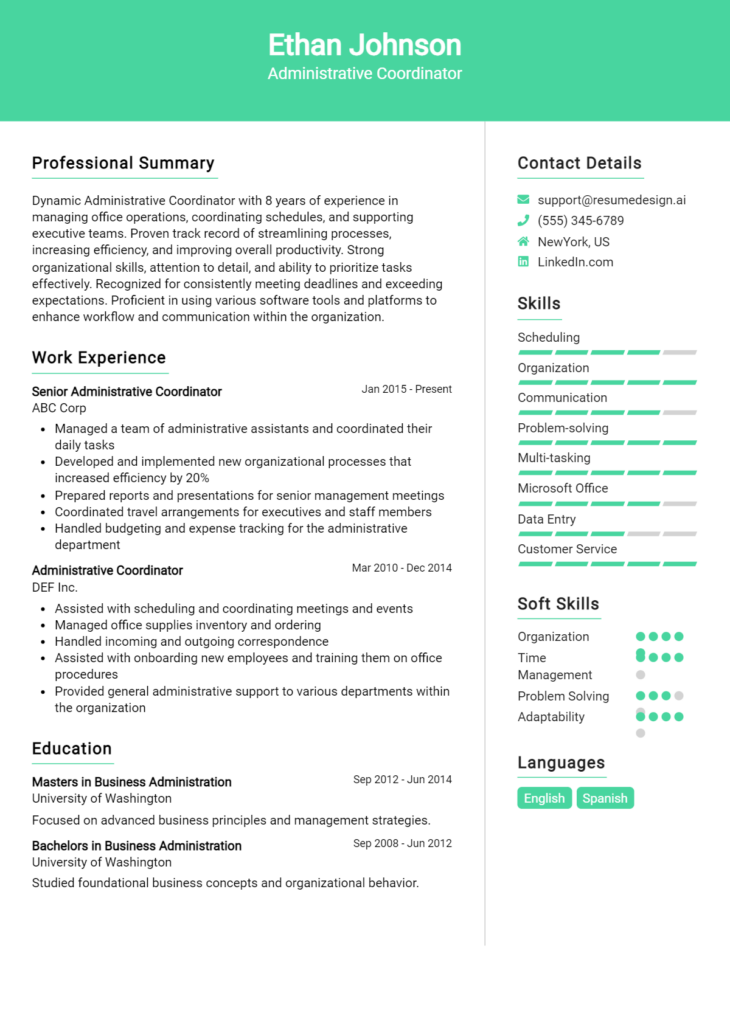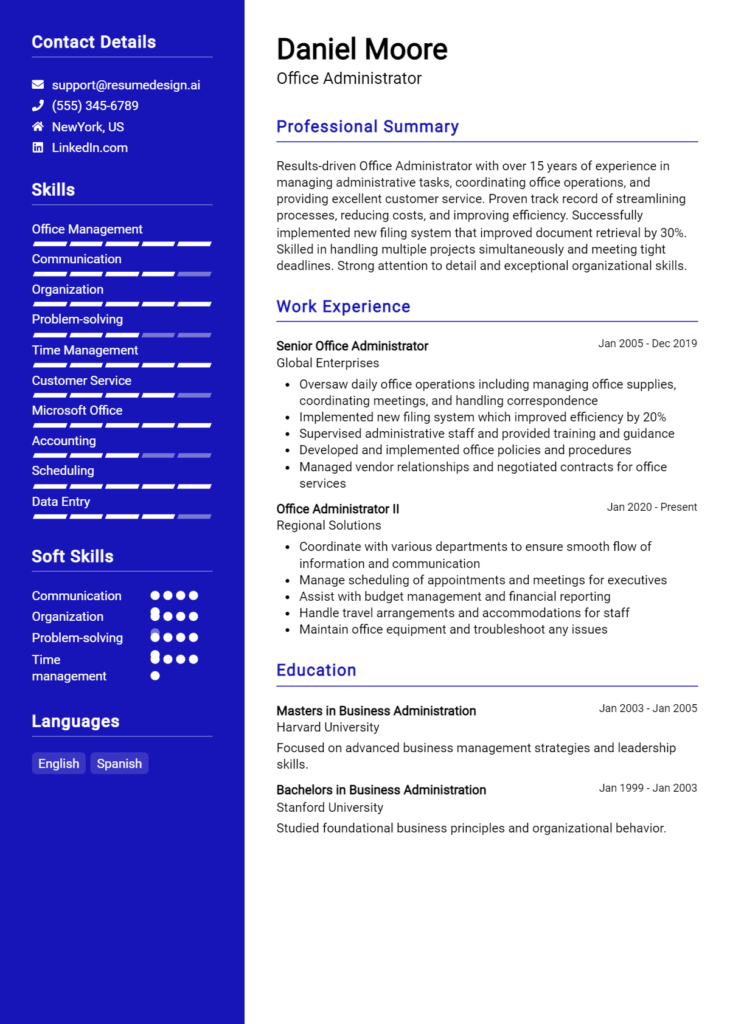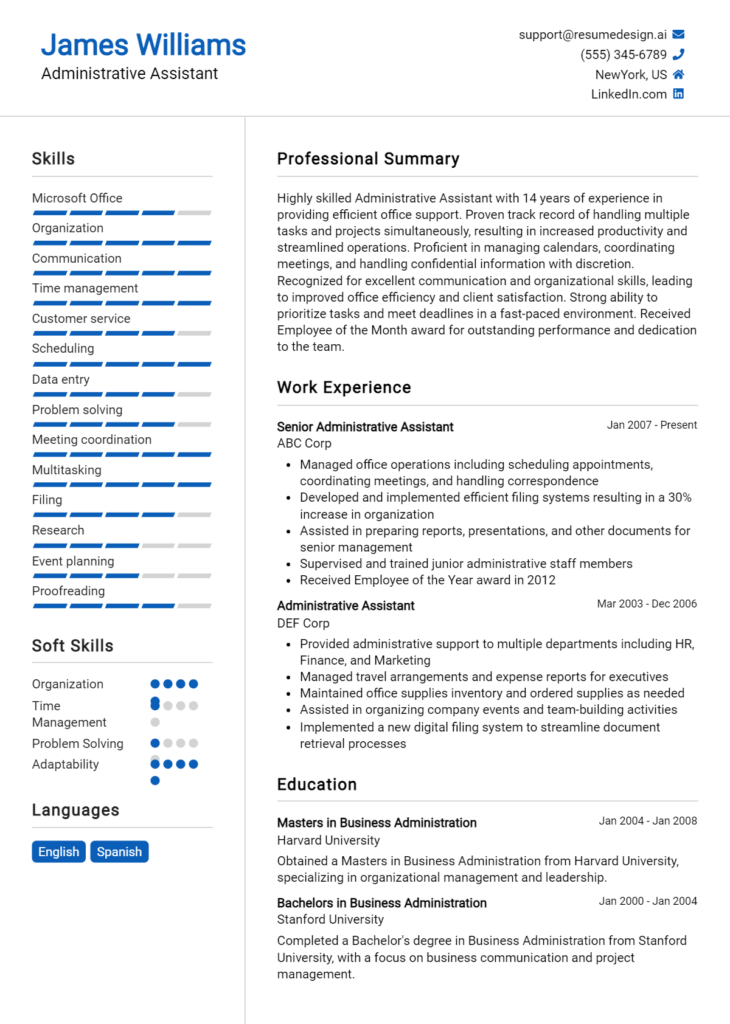Executive Assistant Core Responsibilities
The Executive Assistant plays a vital role in ensuring seamless communication and coordination among various departments within an organization. Key responsibilities include managing schedules, organizing meetings, and facilitating information flow, which require strong technical skills, operational expertise, and adept problem-solving abilities. These competencies not only enhance organizational efficiency but also contribute significantly to achieving company goals. A well-structured resume that highlights these qualifications can effectively demonstrate the candidate's value to potential employers.
Common Responsibilities Listed on Executive Assistant Resume
- Managing executive calendars and scheduling appointments
- Coordinating travel arrangements and itineraries
- Preparing and editing correspondence, reports, and presentations
- Organizing and coordinating meetings and conferences
- Maintaining filing systems and managing documents
- Acting as a liaison between executives and other departments
- Handling confidential information with discretion
- Assisting in project management and tracking deadlines
- Conducting research and compiling data for reports
- Managing office supplies and vendor relationships
- Implementing office policies and procedures
- Providing administrative support to additional team members as needed
High-Level Resume Tips for Executive Assistant Professionals
In today’s competitive job market, a well-crafted resume is essential for Executive Assistant professionals looking to make a strong first impression on potential employers. Since the resume is often the first point of contact between a candidate and a hiring manager, it must effectively showcase not only the relevant skills and accomplishments but also the unique value the candidate brings to the role. A compelling resume can set the tone for the entire hiring process, making it crucial for Executive Assistants to present their experience in a clear, concise, and impactful manner. This guide will provide practical and actionable resume tips specifically tailored for Executive Assistant professionals, enabling them to stand out in a crowded field.
Top Resume Tips for Executive Assistant Professionals
- Tailor your resume to the job description by incorporating keywords and phrases that align with the specific requirements of the position.
- Highlight relevant experience, focusing on past roles that demonstrate your ability to manage schedules, coordinate meetings, and support executives effectively.
- Quantify your achievements by using specific metrics, such as the number of meetings organized, the percentage of time saved through efficient processes, or the size of budgets managed.
- Showcase industry-specific skills, such as proficiency in office software, project management tools, or communication platforms that are commonly used in your target industry.
- Include a summary statement at the top of your resume that encapsulates your professional identity and key strengths as an Executive Assistant.
- Utilize a clean and professional format that enhances readability, making sure to use bullet points for easy scanning of your accomplishments.
- Incorporate relevant certifications or training that demonstrate your commitment to professional development and enhance your qualifications.
- Emphasize soft skills such as communication, organization, and problem-solving, which are essential for success in an Executive Assistant role.
- Keep your resume concise, ideally one page, ensuring that every word adds value and is relevant to the position you are applying for.
By implementing these tips, Executive Assistant professionals can significantly enhance their resumes, improving their chances of capturing the attention of hiring managers and ultimately landing their desired job. A thoughtfully crafted resume not only highlights your qualifications but also reflects your attention to detail and professionalism, qualities that are essential in the Executive Assistant role.
Why Resume Headlines & Titles are Important for Executive Assistant
In the competitive landscape of job applications, a well-crafted resume headline or title can be a game changer for Executive Assistant candidates. This concise phrase serves as a powerful first impression, allowing applicants to summarize their key qualifications and expertise in a way that instantly grabs the attention of hiring managers. A strong headline should be relevant to the position being applied for, encapsulating the candidate's core skills and experiences in a compelling manner. By effectively communicating what sets them apart, a well-designed headline can significantly enhance the chances of landing an interview.
Best Practices for Crafting Resume Headlines for Executive Assistant
- Keep it concise: Aim for one to two impactful sentences.
- Make it role-specific: Tailor your headline to align with the specific Executive Assistant position.
- Highlight key skills: Focus on the skills and experiences most relevant to the job.
- Use strong action words: Begin with powerful verbs that convey proactivity.
- Include quantifiable achievements: If possible, mention specific accomplishments to demonstrate your effectiveness.
- Avoid buzzwords and clichés: Stay clear of overused phrases that lack substance.
- Maintain professionalism: The tone should reflect the formal nature of the role.
- Test for clarity: Ensure your headline is easily understandable and directly communicates your value.
Example Resume Headlines for Executive Assistant
Strong Resume Headlines
"Detail-Oriented Executive Assistant with 5+ Years of Experience Supporting C-Suite Executives"
“Proactive Executive Assistant Specializing in Streamlining Office Operations and Enhancing Team Productivity”
“Multilingual Executive Assistant with Proven Track Record in International Client Relations and Event Coordination”
Weak Resume Headlines
“Executive Assistant Looking for a Job”
“Hardworking Professional”
Strong resume headlines excel because they are specific, actionable, and directly relevant to the Executive Assistant role, making it easy for hiring managers to recognize the candidate’s value at a glance. In contrast, weak headlines lack clarity and specificity, failing to communicate the candidate's unique qualifications or demonstrate their fit for the position. By avoiding generic phrases and instead focusing on what makes them stand out, candidates can effectively capture the attention of potential employers.
Writing an Exceptional Executive Assistant Resume Summary
A well-crafted resume summary is essential for an Executive Assistant, serving as a powerful introduction that can quickly capture the attention of hiring managers. This brief overview highlights key skills, relevant experience, and notable accomplishments, providing a compelling snapshot of the candidate's qualifications for the role. A strong summary is concise and impactful, tailored to the specific job description, ensuring that it resonates with the employer's needs and demonstrates the candidate's unique value proposition.
Best Practices for Writing a Executive Assistant Resume Summary
- Quantify Achievements: Use numbers and metrics to showcase your impact, such as reducing office expenses by 20% or managing a calendar with over 300 appointments monthly.
- Focus on Skills: Highlight specific skills relevant to the Executive Assistant role, such as project management, communication, and organizational skills.
- Tailor to the Job Description: Customize your summary for each job application to reflect the qualifications and experiences that align with the employer’s requirements.
- Keep it Concise: Aim for 3-5 sentences that encapsulate your professional identity and key qualifications without overwhelming the reader.
- Use Action Verbs: Start sentences with strong action verbs to convey initiative and effectiveness, such as "Coordinated," "Managed," or "Streamlined."
- Showcase Soft Skills: Include soft skills such as adaptability, problem-solving, and interpersonal abilities that are crucial for an Executive Assistant.
- Highlight Relevant Technology: Mention proficiency in key software and tools, such as Microsoft Office Suite, calendar management tools, or project management software.
- Maintain Professional Tone: Ensure the language is professional and aligned with the expectations of corporate environments.
Example Executive Assistant Resume Summaries
Strong Resume Summaries
Dynamic Executive Assistant with over 5 years of experience supporting C-suite executives in fast-paced environments. Successfully managed complex calendars, coordinated travel arrangements, and facilitated communication among teams, resulting in a 30% increase in operational efficiency.
Detail-oriented Executive Assistant adept at multitasking and prioritizing tasks effectively. Spearheaded the implementation of a new project management system that improved team collaboration and reduced project timelines by 15%.
Proactive Executive Assistant with a proven track record of maintaining confidentiality and managing sensitive information. Developed streamlined processes that decreased administrative errors by 25% and improved overall office productivity.
Weak Resume Summaries
I am an Executive Assistant with experience in various administrative tasks. I am hardworking and organized.
Executive Assistant seeking new opportunities. I can do many things and have some skills in office management.
The strong resume summaries are effective because they provide specific, quantifiable achievements and highlight relevant skills that directly pertain to the Executive Assistant role. In contrast, the weak summaries lack detail and specificity, failing to communicate the candidate's value or unique contributions, which makes them less compelling to potential employers.
Work Experience Section for Executive Assistant Resume
The work experience section of an Executive Assistant resume is crucial as it serves as a platform to showcase the candidate's technical skills, leadership qualities, and ability to manage teams effectively. This section not only highlights relevant experience but also demonstrates how the candidate has successfully delivered high-quality results in various roles. Quantifying achievements—such as improved efficiency, cost savings, or projects completed on time—helps to align the experience with industry standards, making it easier for hiring managers to assess the candidate's fit for the role.
Best Practices for Executive Assistant Work Experience
- Use specific metrics to quantify achievements, such as percentage increases in efficiency or cost reductions.
- Highlight technical skills relevant to the position, including software proficiency and project management tools.
- Demonstrate leadership abilities by detailing experiences managing teams or leading projects.
- Tailor your work experience to align with the job description and industry standards.
- Include keywords from the job posting to enhance visibility in applicant tracking systems.
- Showcase collaboration by describing instances where you worked effectively with cross-functional teams.
- Focus on outcomes and results rather than just listing responsibilities.
- Present work experiences in reverse chronological order for clarity and relevance.
Example Work Experiences for Executive Assistant
Strong Experiences
- Managed the scheduling and coordination of 5 executive-level meetings per week, resulting in a 30% increase in team productivity.
- Implemented a new document management system that reduced file retrieval times by 50%, improving operational efficiency.
- Collaborated with cross-departmental teams on a project that increased departmental revenue by 15% within six months.
- Trained and mentored a team of 3 junior administrative staff, enhancing their skills and improving overall team performance by 20%.
Weak Experiences
- Responsible for managing schedules and meetings.
- Assisted in organizing office events.
- Handled various administrative tasks.
- Worked with other team members on projects.
The examples labeled as strong demonstrate clear quantifiable outcomes, technical leadership, and successful collaboration, which are essential for an Executive Assistant role. In contrast, the weak experiences lack specificity and measurable results, making it difficult for potential employers to gauge the candidate's impact or capabilities. Clear, quantifiable achievements and detailed descriptions of teamwork help convey the candidate's value effectively.
Education and Certifications Section for Executive Assistant Resume
The education and certifications section in an Executive Assistant resume is vital as it showcases the candidate's academic background, industry-relevant certifications, and commitment to continuous learning. This section not only reflects a candidate's foundational knowledge but also their proactive approach to gaining qualifications that enhance their skills and capabilities. By providing relevant coursework, certifications, and any specialized training, candidates can significantly bolster their credibility and demonstrate how their educational experiences align with the requirements of the job role. A well-crafted education and certifications section can set a candidate apart in a competitive job market.
Best Practices for Executive Assistant Education and Certifications
- Prioritize relevant degrees and certifications that directly relate to executive assistance or administrative roles.
- Include specific coursework that addresses skills needed for the position, such as project management or advanced communication.
- Highlight industry-recognized certifications, such as Certified Administrative Professional (CAP) or Microsoft Office Specialist (MOS).
- Keep the section concise and focused, avoiding unnecessary details about unrelated education.
- List certifications in order of relevance and recency, emphasizing the most pertinent qualifications at the top.
- Include any specialized training or workshops that demonstrate skill enhancement in areas like technology or time management.
- Clearly indicate the dates of completion for certifications to convey up-to-date knowledge.
- Use bullet points for clarity and ease of reading, making it simple for hiring managers to scan the qualifications quickly.
Example Education and Certifications for Executive Assistant
Strong Examples
- Bachelor of Arts in Business Administration, University of Anytown, 2021
- Certified Administrative Professional (CAP), International Association of Administrative Professionals, 2022
- Microsoft Office Specialist (MOS), Microsoft, 2023
- Project Management Fundamentals, Online Course, Coursera, 2023
Weak Examples
- High School Diploma, Anytown High School, 2015
- Certificate in Retail Management, Local Community College, 2018
- Basic Computer Skills, Online Course, 2010
- Outdated certification in Typing Speed, Typing Institute, 2005
The strong examples are considered relevant and impactful as they directly align with the skills and qualifications needed for an Executive Assistant role, showcasing both formal education and professional certifications that are current and recognized in the industry. In contrast, the weak examples demonstrate a lack of relevance to the position, featuring outdated qualifications and unrelated fields of study that do not contribute to the candidate's suitability for an Executive Assistant role.
Top Skills & Keywords for Executive Assistant Resume
In the competitive landscape of administrative roles, the importance of showcasing relevant skills on an Executive Assistant resume cannot be overstated. Employers seek candidates who not only possess the technical know-how to manage office tasks but also exhibit the interpersonal qualities that foster a collaborative work environment. A well-rounded resume that highlights both hard and soft skills can set a candidate apart, demonstrating their ability to effectively support executives and contribute positively to the organization. By emphasizing these skills, candidates can create a compelling narrative that aligns their capabilities with the demands of the role, ultimately enhancing their chances of securing an interview.
Top Hard & Soft Skills for Executive Assistant
Soft Skills
- Excellent communication skills
- Strong organizational abilities
- Time management
- Adaptability and flexibility
- Problem-solving skills
- Attention to detail
- Team collaboration
- Proactive attitude
- Emotional intelligence
- Interpersonal skills
Hard Skills
- Proficiency in office software (e.g., Microsoft Office Suite, Google Workspace)
- Calendar management
- Travel coordination
- Document preparation and formatting
- Data entry and management
- Basic bookkeeping and accounting
- Project management tools (e.g., Asana, Trello)
- Research and information gathering
- Knowledge of CRM software
- Event planning and coordination
For a more comprehensive understanding of how to effectively showcase your skills and work experience, consider investing time in refining your resume to highlight these essential attributes.
Stand Out with a Winning Executive Assistant Cover Letter
Dear [Hiring Manager's Name],
I am writing to express my interest in the Executive Assistant position at [Company Name], as advertised on [where you found the job posting]. With over [X years] of experience in providing high-level administrative support to executives and a proven track record of enhancing office efficiency, I am confident in my ability to contribute to your team. My strong organizational skills, attention to detail, and proactive approach to problem-solving make me an ideal candidate for this role.
In my previous role at [Previous Company Name], I successfully managed a diverse range of administrative tasks, including calendar management, travel arrangements, and the coordination of meetings and events. By implementing a new digital filing system, I improved document retrieval times by 30%, which not only streamlined processes but also allowed the executive team to focus on strategic initiatives. My ability to prioritize tasks and work under pressure has been crucial in meeting tight deadlines and maintaining a high level of service.
I am particularly drawn to the opportunity at [Company Name] because of its commitment to [mention any specific values or initiatives of the company that resonate with you]. I believe my experience in supporting senior executives, along with my proficiency in [specific software or tools relevant to the job], will enable me to provide exceptional support and contribute positively to your team dynamics. I am excited about the possibility of working in an environment that values collaboration and innovation.
Thank you for considering my application. I look forward to the opportunity to discuss how my skills and experiences align with the needs of [Company Name]. I am eager to contribute to the success of your organization and support your executive team in achieving their goals.
Sincerely,
[Your Name]
[Your Phone Number]
[Your Email Address]
Common Mistakes to Avoid in a Executive Assistant Resume
When crafting a resume for the role of an Executive Assistant, it's essential to present a polished and professional image that effectively showcases your skills and experiences. However, many candidates inadvertently make common mistakes that can hinder their chances of landing an interview. By avoiding these pitfalls, you can create a standout resume that highlights your qualifications and makes a strong impression on potential employers.
Neglecting Tailoring: Failing to customize your resume for the specific job can lead to a generic presentation that doesn't align with the employer's needs. Tailor your resume by incorporating keywords from the job description.
Overloading with Jargon: Using excessive industry jargon or acronyms can confuse the reader. Instead, strive for clarity and ensure your language is accessible to a broad audience.
Omitting Relevant Skills: Focusing solely on administrative tasks can overlook critical skills such as project management, communication, and problem-solving. Highlight a diverse set of competencies that reflect the demands of the role.
Ignoring Formatting Consistency: A disorganized or inconsistent format can detract from your professionalism. Use a clear, uniform structure with appropriate headings, bullet points, and font styles to enhance readability.
Listing Duties Instead of Achievements: Simply listing job duties fails to demonstrate your impact. Instead, emphasize accomplishments and quantify results where possible, showcasing how you contributed to your previous employers.
Neglecting Soft Skills: While technical skills are important, soft skills like adaptability, interpersonal communication, and time management are equally crucial for an Executive Assistant. Be sure to highlight these traits.
Using an Unprofessional Email Address: An email address that is overly casual or humorous can undermine your professionalism. Use a simple format that incorporates your name for a more polished image.
Including Irrelevant Information: Providing excessive personal details or unrelated job experiences can clutter your resume. Focus on relevant experience that directly pertains to the Executive Assistant role you’re applying for.
Conclusion
In summary, the role of an Executive Assistant is multifaceted, requiring a unique blend of organizational skills, communication prowess, and adaptability. This position often serves as the backbone of an executive's operations, facilitating effective time management and ensuring smooth workflow across the organization. Key responsibilities typically include managing schedules, coordinating meetings, handling correspondence, and supporting project management initiatives.
To excel in this role, it's essential to highlight relevant experience and skills in your resume. Tailoring your resume to showcase your capabilities in these areas can significantly enhance your chances of landing an interview.
Now is the perfect time to review your Executive Assistant resume to ensure it reflects your qualifications effectively. Utilize available resources to bolster your application. Explore resume templates to find a design that fits your professional style, or try our resume builder for a streamlined approach. If you need inspiration, check out our resume examples that demonstrate best practices in showcasing your skills. Don’t forget to complement your resume with a compelling cover letter template that encapsulates your professional narrative. Take action today and elevate your job application to stand out in the competitive job market!

